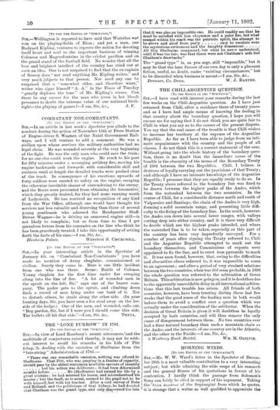THE CHILI-ARGENTINE QUESTION.
[To THE EDITOR Or THE " SPECTATOR.”) SIR,—I have read with interest your remarks during the last few weeks on the Chili-Argentine question. As I have just returned from Chili, after a residence. there of twenty years, and as I have had ample means of knowing the feeling in that country about the boundary question, I hope you will excuse me for saying that I do not think you are quite fair to Chili in what you say as to the causes of the present dispute. You say that the real cause of the trouble is that Chili wishes to increase her territory at the expense of the Argentine Republic. As far as I have been able to judge from an inti- mate acquaintance with the country and the people of all classes, I do not think this is a correct statement of the case. Without going into the whole history of the boundary ques- tion, there is no doubt that the immediate cause of the trouble is the obscurity of the terms of the Boundary Treaty of 1881 between the two Republics. Chili, I believe, is desirous of loyally carrying out the provisions of that Treaty; and although I have no intimate knowledge of the Argentine Republic, I presume that they are equally ready to do so. In the Treaty above referred to the boundary line was fixed to be drawn between the highest peaks of the Andes, which form the watershed between the two countries. In the centre of Chili, for a considerable distance north and south of Valparaiso and Santiago, the chain of the Andes is very high, forming a solid mountain range, and presenting little diffi- culty to the fixing of the boundary line. In the south, however. the Andes run down into several lower ranges, with valleys cutting deep into either country, and it is there very difficult to decide which are the highest peaks intended, and where the watershed line is to be taken, especially as this part of the country has been very imperfectly surveyed. For a number of years after signing the Treaty referred to, Chili and the Argentine Republic attempted to mark out the boundary themselves, and Commissions of experts were appointed to fix the line, and to erect iron pyramids to mark it. It was soon found, however, that, owing to the difficulties and obscurities above referred to, it was impossible to come to an agreement ; and after a period of very strained relations between the two countries, when war did seem probable, in 1898 the whole question was referred to the arbitration of Great Britain. This arbitration is now going on, and it is doubtless due to the apparently unavoidable delay in all international arbitra- tions that this last trouble has arisen. All friends of both countries, however, have been trusting during these last few weeks that the good sense of the leading men in both would induce them to avoid a conflict over a question which was actually under the consideration of the arbitrator. When the decision of Great Britain is given it will doubtless be loyally accepted by both countries, and will thus remove the only cause of disagreement between them. No two countries ever had a finer natural boundary than such a mountain chain as the Andes, and the interests of one country are in the Atlantic, and the other in the Pacific.—I am, Sir, &c.,






































 Previous page
Previous page